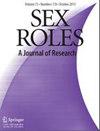Explaining Societal Shifts in Victim Blaming and Perpetrator Culpability for Sexual Violence: Evidence From the #MeToo Era.
IF 3.4
2区 社会学
Q2 PSYCHOLOGY, DEVELOPMENTAL
引用次数: 0
Abstract
Despite increasing public condemnation of sexual violence, it is unclear how these social and political changes correspond to shifts in individual attitudes. This study investigates how attitudes toward sexual violence changed in Scotland, in the context of the #MeToo movement. This study applies the threefold Kitagawa-Oaxaca-Blinder decomposition to the cross-sectional 2014 and 2019 Scottish Social Attitudes Surveys (N = 2133) to investigate how attitudes towards victim blaming and perpetrator culpability have changed over time. Perceptions of perpetrator culpability increased and victim blaming decreased significantly between 2014 and 2019. Reduction in victim blaming was associated with the liberalization of gender role attitudes and the increased influence of political interest on attitudes in 2019. Heightened perceptions of perpetrator culpability were associated with declining levels of authoritarianism, as well as greater attitudinal changes amongst women and left-wingers relative to other social groups. The findings highlight the importance of both societal shifts in value orientations and gender attitudes, as well as divergent patterns of change amongst different social groups. Implications for other populations, policy, and consent education are discussed. Supplementary Information The online version contains supplementary material available at 10.1007/s11199-025-01590-6.解释性暴力的受害者指责和肇事者罪责的社会转变:来自#MeToo时代的证据。
尽管公众对性暴力的谴责越来越多,但尚不清楚这些社会和政治变化如何与个人态度的转变相对应。这项研究调查了在#MeToo运动的背景下,苏格兰对性暴力的态度是如何变化的。本研究将Kitagawa-Oaxaca-Blinder三重分解应用于2014年和2019年横断面苏格兰社会态度调查(N = 2133),以调查对受害者指责和肇事者罪责的态度如何随着时间的推移而变化。2014年至2019年期间,人们对加害者罪责的看法有所增加,对受害者的指责明显减少。2019年,指责受害者的减少与性别角色态度的自由化以及政治利益对态度的影响增加有关。对犯罪者罪责的高度认知与威权主义水平的下降有关,与其他社会群体相比,女性和左翼人士的态度变化也更大。研究结果强调了价值取向和性别态度的社会转变的重要性,以及不同社会群体之间变化的不同模式。讨论了对其他人群、政策和同意教育的影响。补充信息在线版本包含补充资料,网址为10.1007/s11199-025-01590-6。
本文章由计算机程序翻译,如有差异,请以英文原文为准。
求助全文
约1分钟内获得全文
求助全文
来源期刊

Sex Roles
Multiple-
CiteScore
7.20
自引率
5.30%
发文量
70
期刊介绍:
Sex Roles: A Journal of Research is a global, multidisciplinary, scholarly, social and behavioral science journal with a feminist perspective. It publishes original research reports as well as original theoretical papers and conceptual review articles that explore how gender organizes people’s lives and their surrounding worlds, including gender identities, belief systems, representations, interactions, relations, organizations, institutions, and statuses. The range of topics covered is broad and dynamic, including but not limited to the study of gendered attitudes, stereotyping, and sexism; gendered contexts, culture, and power; the intersections of gender with race, class, sexual orientation, age, and other statuses and identities; body image; violence; gender (including masculinities) and feminist identities; human sexuality; communication studies; work and organizations; gendered development across the life span or life course; mental, physical, and reproductive health and health care; sports; interpersonal relationships and attraction; activism and social change; economic, political, and legal inequities; and methodological challenges and innovations in doing gender research.
 求助内容:
求助内容: 应助结果提醒方式:
应助结果提醒方式:


